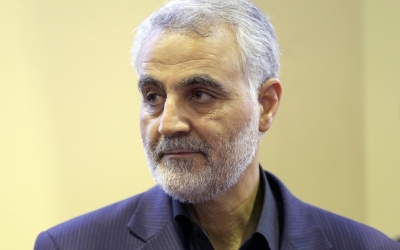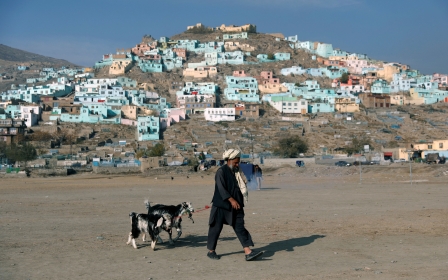Iran's new Quds Force commander vows 'manly' response to Soleimani assassination

The newly appointed commander of Iran's Quds Force has said his predecessor, Qassem Soleimani, was killed "in a cowardly way," and has vowed to strike back at the United States "in a manly fashion".
Esmail Qaani made the remarks on Monday at a ceremony marking the formal beginning of his tenure.
Iran's Quds Force is part of the 125,000-strong Revolutionary Guard (IRGC) which has been successful in building loyal proxy forces throughout the Middle East.
"They [the US] hit him [Soleimani] in a cowardly way, but with God's grace and through endeavours of freedom-seekers around the world who want vengeance over his blood, we will hit his enemy in a manly fashion," Qaani said.
"The enemy knows nothing but the language of force, so we will deal firmly with him."
The assassination of Qassem Soleimani by a US drone strike on 3 January set in motion a series of events that ratcheted up tensions with the potential to spiral towards conflict.
Iran promised "severe revenge" after Soleimani's killing, with Tehran firing a salvo of missiles at two military bases in Iraq housing US forces.
There were no casualties reported in the reprisal attacks, and Iran was reported to have notified the facilites well in advance. On the same morning as the strikes Iranian missiles accidentally shot down a Ukrainian airliner, killing all 176 people on board and sparking a backlash in Iran.
The Trump administration had cited the threat of "imminent attacks" against US assets as the main reason behind the order to kill Soleimani.
What those imminent attacks might have been has not been made clear.
Iran threatens to leave nuclear deal
A top aide to Soleimani, Qaani fought in the Iran-Iraq war and was an intelligence official in the corps.
However, the bespectacled Qaani, whose portfolio as deputy includes Quds Force operations in Afghanistan, Pakistan and Central Asian republics, boasts few notable military victories.
Whereas under Soleimani, the Quds Force shored up support for Assad when he looked close to defeat in the Syrian civil war that has been raging since 2011.
At the slain commander's funeral, Qaani, 62, pledged to continue on his predecessor's path "with the same force," saying his assassination "will be reciprocated in several steps by removing the US from the region".
Though military escalations have since calmed, with Trump even tweeting "all is well," tensions in the region remain volatile.
On Monday, Iran threatened to leave the nuclear Non-Proliferation Treaty (NPT), a pact that bars countries from obtaining atomic weapons, if Europe were to take Tehran before the United Nations Security Council over its alleged violations of a 2015 accord it signed with the West.
Iran was among the original signers of the 1970 Non-Proliferation Treaty, which gives non-nuclear weapons states access to atomic technology in exchange for not pursuing a bomb.
But in 2003 it was found to be in "non-compliance" with the deal after it became known that the country had launched a secret programme to enrich uranium, one of the pathways towards obtaining a nuclear weapon.
Iran has always insisted it pursued a peaceful nuclear programme, including energy and medicine, even as the United States and other countries suspected it might be developing a nuclear weapons programme.
Middle East Eye delivers independent and unrivalled coverage and analysis of the Middle East, North Africa and beyond. To learn more about republishing this content and the associated fees, please fill out this form. More about MEE can be found here.






